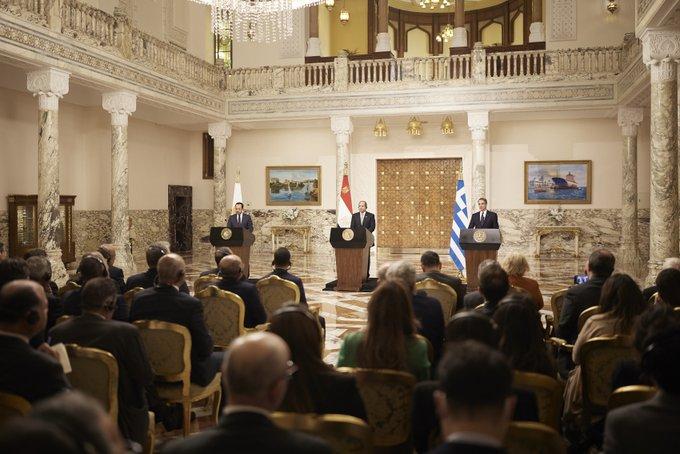
Egypt, Cyprus and Greece warn of regional instability after Syrian regime change
The leaders of Egypt, Cyprus and Greece called for a timeline for Syria’s political transition on Wednesday, citing fears any delay could lead to further instability in the region.
The trio had convened for a trilateral summit in Cairo, where they discussed the pressing issues facing the Middle East, particularly the rapidly evolving situation in Syria following the fall of President Bashar Al Assad on December 8.
Egyptian President Abdel Fattah El Sisi said co-operation between the three nations is “vital, particularly in light of recent developments in the Middle East,” and called for intense efforts to resolve the conflicts in the region, warning that failure to do so could lead to an all-out regional war, resulting in a displacement crisis and an increase in illegal migration.
Cypriot President Nikos Christodoulides echoed Mr El Sisi’s concerns, stating: “Our region is less secure and more unstable than it has ever been” and that the three countries need to work to offset the political manoeuvring of “other countries in the region”, in a presumed reference to Turkey, which has thus far supported the rise of the Hayat Tahrir Al Sham (HTS) group in Syria.
HTS, which has its roots in Al Qaeda, has taken control of key sectors in Syria after toppling Mr Al Assad last month. This has heightened fears about the safety of religious minorities and the potential for extremist elements to gain a foothold in the region.
Mr Christodoulides’ statements were made less than an hour before the Cypriot Ministry of Foreign Affairs officially condemned the illegal passage of Turkish Foreign Minister Hakan Fidan into the “occupied territories” of Cyprus, the ministry said in a statement.
It views Mr Fidan’s actions as a violation of international law and an affront to the sovereignty and territorial integrity of the Republic of Cyprus, it said.
“This action constitutes yet another violation of International Law, which adds to Turkey’s continuing violations against the sovereignty, independence and territorial integrity of the Republic of Cyprus for fifty years,” the Cypriot foreign ministry said. “The Turkish Foreign Minister, with his visit, is sending messages of intransigence and contempt for the decisions of the United Nations and the European Union.”
Greek Prime Minister Kyriakos Mitsotakis stressed the urgent need for a timeline for political transition in Syria to prevent the situation from spiralling out of control.
Mr Mitsotakis also underscored the importance of protecting religious minorities in Syria, a concern shared by Mr El Sisi, whose opposition to Islamist regimes has been one of the defining features of his presidency.
The three leaders cautioned that further conflicts could exacerbate illegal migration into Europe, an issue that has been a key area of co-operation among the trio.
Greece and Cyprus, both members of the European Union, have expressed concerns about Turkey’s growing influence in Syria and its potential impact on the Eastern Mediterranean.
The two countries have long-standing disputes with Turkey over maritime boundaries, exclusive economic zones, and hydrocarbon exploration rights in the Eastern Mediterranean. Greece and Cyprus, in addition to Egypt, are members of the East Mediterranean Gas Forum, a regional organisation established in 2019 to promote co-operation in the energy sector and facilitate the development of natural gas resources in the energy-rich region.
Turkey, which has been excluded from the forum due to its contentious relations with other member states, has criticised the forum as an attempt to sideline Ankara in the region’s energy projects.
The establishment of the HTS government in Syria has raised fears that Ankara may seek to further assert its claims in the Eastern Mediterranean, potentially infringing upon Greek and Cypriot sovereignty.
Egypt, which has hosted more than 1.5 million Syrian refugees since the start of the Syrian conflict in 2011, has rejected the idea of Islamist governments in the region and expressed concerns over the potential influx of extremists into the country.
Cairo has, since Mr Al Assad’s ouster, taken steps to tighten security measures and restrict travel for Syrians in the country following the regime change.
Syrian nationals, even those holding visas from the United States, European Union, and other powerful countries, are now required to obtain a security clearance from the Egyptian authorities before being allowed entry.
Wednesday’s summit also called for a ceasefire in Gaza and Lebanon and warned that the continuation of the conflict could spell disaster for their interests and the region’s stability as a whole.
“I would like to offer my appreciation for your countries’ positions in support of the Palestinian people, its independence and the establishment of its sovereign state. This is why we must continue intensifying our efforts to end the conflicts in Gaza and Lebanon and accomplish stability in Syria, Sudan, Libya and Yemen,” Mr El Sisi said.
Source » msn.com





